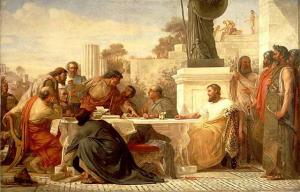On Winning and Losing

Losing is no virtue, but then neither is winning. The Soviets conquered the Baltic states before the Second World War, but this win was immoral and part of a deal signed with Adolph Hitler. The brave people in nations such as Estonia lost and that was not good as losing began a brutal Soviet occupation. Eternally, however, the tyrants of the Soviet Union lost their souls for the price of victory. Defeat in a good cause was from the eternal perspective no shame.
No one should want to lose as the cost can be high. Civil rights marchers hope for positive change, not failure of the just cause. When Reconstruction failed in the United States, millions of Americans paid and still are paying a great cost. The “victory” of white supremacy, especially in the South, did nothing to make the evil of the “Lost Cause” any less evil. Winning cannot justify a bad cause, anymore than losing can make a just cause unjust.
Christians keep score in the light of eternity, because we know before the Lord Jesus returns to rule, no just cause is won forever and no bad idea stays dead. New generations come that must make progress toward the beloved community or at least not set back the gains made by their ancestors. Old wickedness can be given a new defense and generations that did not know the previous struggles can give zombie strength to a formerly dead evil.
We fight for racial justice, for the poor, the sick, the orphan, the unborn and the imprisoned, because these are causes the Lord Jesus told us to support. We ask God for grace to be virtuous, not because of polling or trends, but because God is good and we would be like God. We fail, but those are the goals: Thy Kingdom come, Thy will be done, on Earth as it is in Heaven.
An Example: Holy Hieromartyr Dorotheus, Bishop of Tyre
Hagiography illustrates the Christian attitude toward “winning” in the life of the Christian pastor and leader Dorotheus. He was a hardworking church leader unfortunate enough to minister during some of the worst persecutions of Christians in the Roman Empire. He fled for his life and managed to survive to see the advent of Constantine. The church finally was free and while this brought problems, not getting tortured was a good thing! People who might have apostatized under state pressure did not. Texts were no longer destroyed. Less bad is always good.
Bishop Dorotheus had been on the losing side, kept his integrity, and then found himself under the “sign that conquered.” He attended the Council of Nicaea: a remarkable triumph for right reason. Dorotheus received another blessing. He lived a very, very long time. Still, the bishop lived just long enough to see the brutal pagan revival under Julian the Apostate. His great learning and age did not save him and he died a martyr. He died on the losing team.
His next waking thought was with King Jesus. He no longer had to deal with the burdens of “winning” or the horrors of “losing.” All his own vices were burned away. In his life he was losing, painfully, winning, gloriously, losing unto death. Because he kept his eyes on eternity, his final state was total victory without any of the liabilities that always come with power. The theological portrait of his life was: losing, winning, losing, won.
Christians pray for peace and justice in this life, work towards the beloved community best we can, and leave the final outcomes to God. This is the way to win big.












